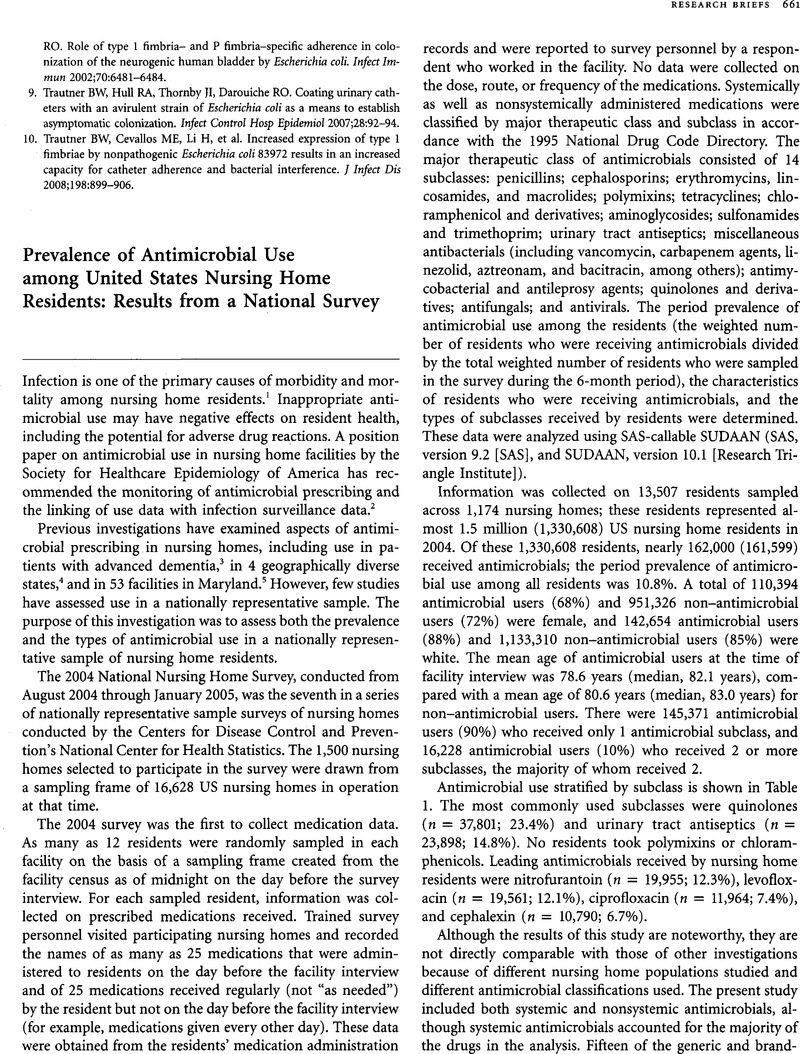Crossref Citations
This article has been cited by the following publications. This list is generated based on data provided by Crossref.
Daneman, N.
Gruneir, A.
Newman, A.
Fischer, H. D.
Bronskill, S. E.
Rochon, P. A.
Anderson, G. M.
and
Bell, C. M.
2011.
Antibiotic use in long-term care facilities.
Journal of Antimicrobial Chemotherapy,
Vol. 66,
Issue. 12,
p.
2856.
Lim, Ching Jou
McLellan, Susan C
Cheng, Allen C
Culton, Joanne M
Parikh, Sneha N
Peleg*, Anton Y
and
Kong*, David C M
2012.
Surveillance of infection burden in residential aged care facilities.
Medical Journal of Australia,
Vol. 196,
Issue. 5,
p.
327.
Marcum, Zachary A.
Peron, Emily P.
and
Hanlon, Joseph T.
2012.
The Epidemiology of Aging.
p.
317.
Szabó, Rita
and
Böröcz, Karolina
2014.
Antimicrobial use in Hungarian long-term care facilities: High proportion of quinolone antibacterials.
Archives of Gerontology and Geriatrics,
Vol. 59,
Issue. 1,
p.
190.
Lim, Ching Jou
Kwong, Megan
Stuart, Rhonda L
Buising, Kirsty L
Friedman, N Deborah
Bennett, Noleen
Cheng, Allen C
Peleg, Anton Y
Marshall, Caroline
and
Kong, David CM
2014.
Antimicrobial stewardship in residential aged care facilities: need and readiness assessment.
BMC Infectious Diseases,
Vol. 14,
Issue. 1,
Szabó, Rita
and
Böröcz, Karolina
2014.
Infections and use of antibiotics in residents of long-term care facilities in Hungary.
Orvosi Hetilap,
Vol. 155,
Issue. 23,
p.
911.
Sloane, Philip D.
Kistler, Christine
Mitchell, C. Madeline
Beeber, Anna S.
Bertrand, Rosanna M.
Edwards, Alrick S.
Olsho, Lauren E. W.
Hadden, BA, Louise S.
Bateman, James R.
and
Zimmerman, Sheryl
2014.
Role of Body Temperature in Diagnosing Bacterial Infection in Nursing Home Residents.
Journal of the American Geriatrics Society,
Vol. 62,
Issue. 1,
p.
135.
Lim, Ching Jou
Kwong, Megan W‐L
Stuart, Rhonda L
Buising, Kirsty L
Friedman, N Deborah
Bennett, Noleen J
Cheng, Allen C
Peleg, Anton Y
Marshall, Caroline
and
Kong, David C M
2014.
Antibiotic prescribing practice in residential aged care facilities ‐ health care providers' perspectives.
Medical Journal of Australia,
Vol. 201,
Issue. 2,
p.
101.
Han, J. H.
Maslow, J.
Han, X.
Xie, S. X.
Tolomeo, P.
Santana, E.
Carson, L.
and
Lautenbach, E.
2014.
Risk Factors for the Development of Gastrointestinal Colonization With Fluoroquinolone-Resistant Escherichia coli in Residents of Long-Term Care Facilities.
Journal of Infectious Diseases,
Vol. 209,
Issue. 3,
p.
420.
Doernberg, Sarah B.
Dudas, Victoria
and
Trivedi, Kavita K.
2015.
Implementation of an antimicrobial stewardship program targeting residents with urinary tract infections in three community long-term care facilities: a quasi-experimental study using time-series analysis.
Antimicrobial Resistance and Infection Control,
Vol. 4,
Issue. 1,
Szabó, Rita
and
Böröcz, Karolina
2015.
Infections and antimicrobial use among institutionalized residents in Hungary: Increasing need of microbiological surveillance.
Acta Microbiologica et Immunologica Hungarica,
Vol. 62,
Issue. 1,
p.
29.
Miliani, K
Migueres, B
Verjat-Trannoy, D
Thiolet, J M
Vaux, S
Astagneau, P
and
the French Prevalence Survey Study Group, collective
2015.
National point prevalence survey of healthcare-associated infections and antimicrobial use in French home care settings, May to June 2012.
Eurosurveillance,
Vol. 20,
Issue. 27,
Crnich, Christopher J.
Jump, Robin
Trautner, Barbara
Sloane, Philip D.
and
Mody, Lona
2015.
Optimizing Antibiotic Stewardship in Nursing Homes: A Narrative Review and Recommendations for Improvement.
Drugs & Aging,
Vol. 32,
Issue. 9,
p.
699.
Adler, Amos
Friedman, N. Deborah
and
Marchaim, Dror
2016.
Multidrug-Resistant Gram-Negative Bacilli.
Infectious Disease Clinics of North America,
Vol. 30,
Issue. 4,
p.
967.
Bradley, Suzanne F.
2016.
Antimicrobial Stewardship and Infection Prevention in Long-Term Care Settings: New Strategies to Prevent Resistant Organisms.
Current Geriatrics Reports,
Vol. 5,
Issue. 1,
p.
16.
Eke‐Usim, Angela C.
Rogers, Mary A.M.
Gibson, Kristen E.
Crnich, Christopher
and
Mody, Lona
2016.
Constitutional Symptoms Trigger Diagnostic Testing Before Antibiotic Prescribing in High‐Risk Nursing Home Residents.
Journal of the American Geriatrics Society,
Vol. 64,
Issue. 10,
p.
1975.
Silva, Alanna Gomes
and
Garbaccio, Juliana Ladeira
2016.
Registro do uso de antimicrobianos em Instituições de Longa Permanência para Idosos.
Revista Brasileira de Geriatria e Gerontologia,
Vol. 19,
Issue. 2,
p.
325.
Bradley, Suzanne F.
2016.
Principles of Antimicrobial Therapy in Older Adults.
Clinics in Geriatric Medicine,
Vol. 32,
Issue. 3,
p.
443.
Snyder, Graham M.
Patel, Priti R.
Kallen, Alexander J.
Strom, James A.
Tucker, J. Kevin
and
D'Agata, Erika M.C.
2016.
Factors associated with the receipt of antimicrobials among chronic hemodialysis patients.
American Journal of Infection Control,
Vol. 44,
Issue. 11,
p.
1269.
Marra, Fawziah
McCabe, Mark
Sharma, Prateek
Zhao, Bin
Mill, Christopher
Leung, Victor
Chong, Mei
and
Patrick, David M.
2017.
Utilization of Antibiotics in Long-Term Care Facilities in British Columbia, Canada.
Journal of the American Medical Directors Association,
Vol. 18,
Issue. 12,
p.
1098.e1.



